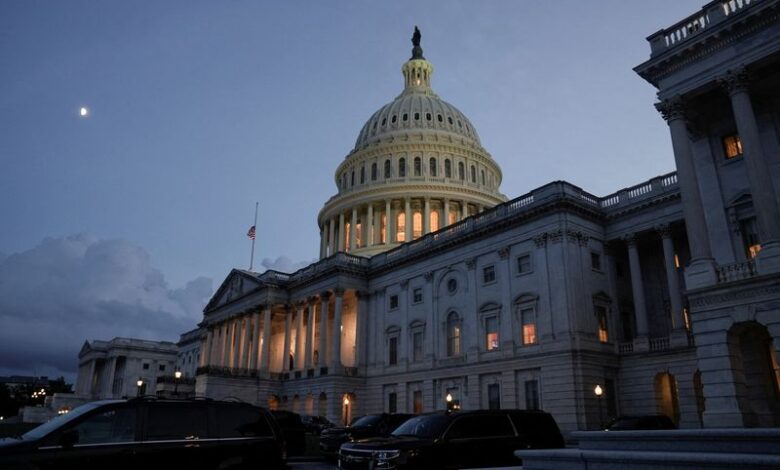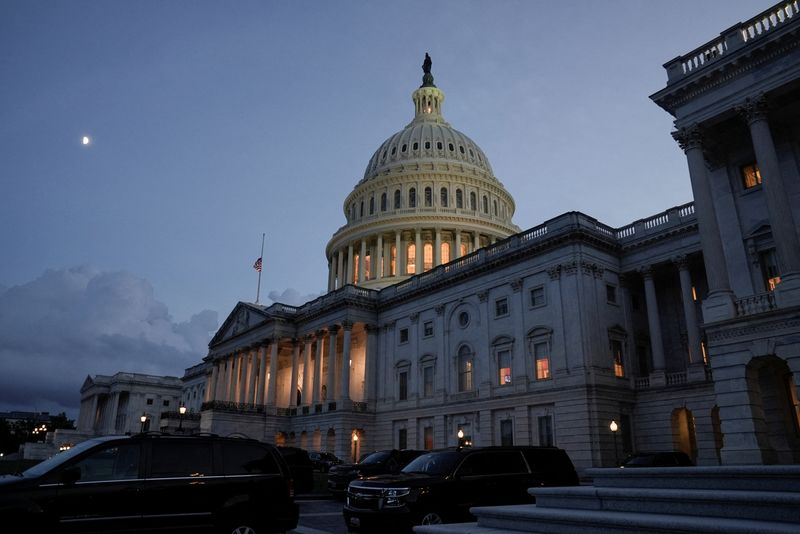President Biden signs $1.2 trillion US spending bill


© Reuters. FILE PHOTO: A general view of the U.S. Capitol after United States Vice President Kamala Harris, voted on the Senate floor to break the 50-50 tie to proceed to the Inflation Reduction Act on Capitol Hill in Washington, D.C., U.S. August 6, 2022. REUTERS/K
By Richard Cowan, David Morgan and Makini Brice
WASHINGTON (Reuters) – President Joe Biden on Saturday signed into law a $1.2 trillion spending package, keeping the U.S. government funded through a fiscal year that began six months ago.
Biden described the package, which Congress overwhelmingly passed in the early hours of Saturday, as investing in Americans as well as strengthening the economy and national security. The Democratic president urged Congress to pass other bills stuck in the legislative chambers.
“The House must pass the bipartisan national security supplemental to advance our national security interests,” Biden said in a statement. “And Congress must pass the bipartisan border security agreement, the toughest and fairest reforms in decades, to ensure we have the policies and funding needed to secure the border. It’s time to get this done.”
The Democratic-majority Senate passed the spending bill with a 74-24 vote. Key federal agencies including the departments of Homeland Security, Justice, State and Treasury, which houses the Internal Revenue Service, will remain funded through Sept. 30.
But the measure did not include funding for mostly military aid to Ukraine, Taiwan or Israel, which are included in a different Senate-passed bill that the Republican-led House of Representatives has ignored.
The business community welcomed the passage of the spending bill and committed to continue working with policymakers to advance legislation that would enhance tax breaks for businesses and low-income families.
“A fully operational U.S. government provides important stability for American businesses, workers and families,” Business Roundtable CEO Joshua Bolten said in a statement. “We look forward to continuing to work with Members of Congress to advance sound policies, including the Tax Relief for American Families and Workers Act.”
Senate leaders spent hours on Friday negotiating a number of amendments to the budget bill that ultimately were defeated. The delay pushed passage beyond a Friday midnight deadline.
But the White House Office of Management and Budget issued a statement saying agencies would not be ordered to shut, expressing confidence the Senate would promptly pass the bill, which it did.
While Congress got the job done, deep partisan divides were on display again, as well as bitter disagreement within the House’s narrow and fractious Republican majority. Conservative firebrand Representative Marjorie Taylor Greene threatened to force a vote to remove Speaker Mike Johnson, a fellow Republican, for allowing the measure to pass.
The 1,012-page bill provides $886 billion in funding for the Defense Department, including a raise for U.S. troops.
Johnson, as he has done more than 60 times since succeeding his ousted predecessor Kevin McCarthy in October, relied on a parliamentary maneuver on Friday to bypass hardliners within his own party, allowing the measure to pass by a 286-134 vote that had substantially more Democratic support than Republican.
For most of the past six months, the government was funded with four short-term stopgap measures, a sign of the repeated brinkmanship that ratings agencies have warned could hurt the creditworthiness of a federal government that has nearly $34.6 trillion in debt.
“This legislation is truly a national security bill — 70% of the funding in this package is for our national defense, including investments that strengthen our military readiness and industrial base, provide pay and benefit increases for our brave servicemembers and support our closest allies,” said Republican Senator Susan Collins, one of the main negotiators.
Opponents cast the bill as too expensive.
“It’s reckless. It leads to inflation. It’s a direct vote to steal your paycheck,” said Senator Rand Paul, part of a band of Republicans who generally oppose most spending bills.
The last partial federal government shutdown occurred during Donald Trump’s presidency, from Dec. 22, 2018, until Jan. 25, 2019. The record-long interruption in government services came as the Republican insisted on money to build a wall along the U.S. border with Mexico and was unable to broker a deal with Democrats.
GREENE LASHES OUT
The new budget bill passed the House with 185 Democratic and 101 Republican votes, which led Greene, a hardline conservative, to introduce her measure to oust Johnson.
That move had echoes of October, when a small band of hardliners engineered a vote that removed McCarthy for relying on Democrats to pass a stopgap measure to avert another partial government shutdown. They had been angry at McCarthy since June, when he agreed with Biden on the outlines of the fiscal 2024 spending that were passed on Friday.
McCarthy’s ouster brought the House to a halt for three weeks as Republicans struggled to agree on a new leader, an experience many in the party said they did not want to repeat as the November election draws nearer.
And Greene said she would not push for an immediate vote on her move to force Johnson out.
“I filed a motion to vacate today. But it’s more of a warning than a pink slip,” the Georgia Republican told reporters on Friday.
Indeed, some Democrats said on Friday that they would vote to keep Johnson, if he were to call a vote on a $95 billion security assistance package already approved by the Senate for Ukraine, Israel and Taiwan.
That measure is unlikely to come up anytime soon, as lawmakers will now leave Washington for a two-week break.
Pockets of Republican opposition to more funding for Ukraine have led to fears that Russia could seriously erode Kyiv’s ability to continue defending itself.
Life is unlikely to become easier for Johnson anytime soon, with the looming departure of two members of his caucus – Ken Buck and Mike Gallagher – set to whittle his majority to a mere 217-213 in a month’s time. At that point, Johnson could afford to lose only one vote from his party on any measure that Democrats unite to oppose.



